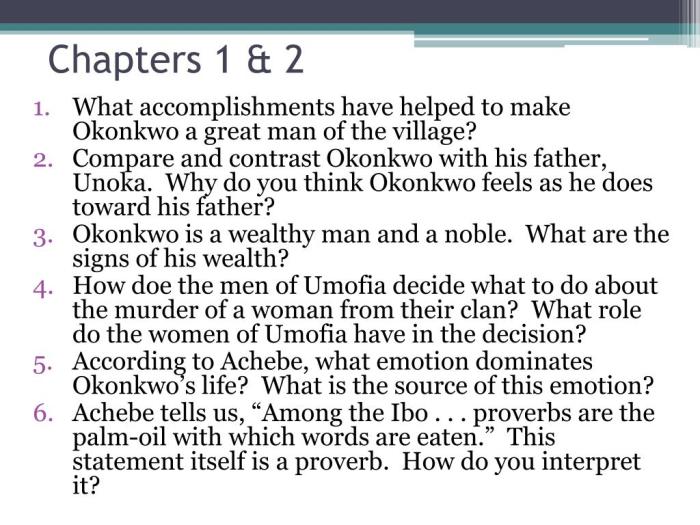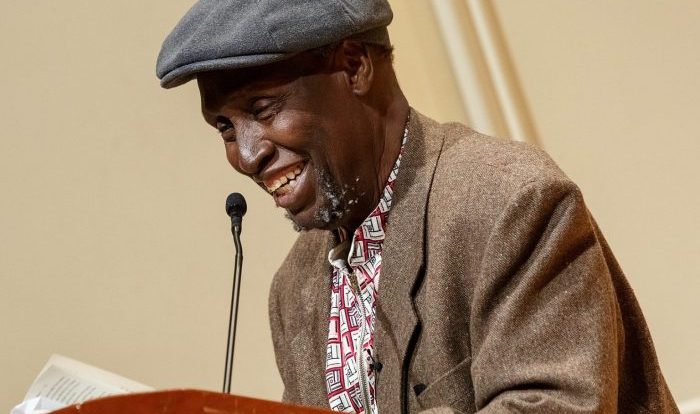Chapter 12 summary things fall apart – In Chapter 12 of Chinua Achebe’s seminal novel, Things Fall Apart, we delve into the escalating tensions between tradition and modernity as the Igbo community of Umuofia grapples with the arrival of Christian missionaries. This chapter provides a microcosm of the larger themes of cultural clash, generational conflict, and the transformative power of belief.
Chapter 12 Overview

Chapter 12 of Things Fall Apart revolves around the pivotal event of Okonkwo’s exile from his village, Umuofia. This significant development sets the stage for a transformative journey that will profoundly impact Okonkwo’s character and the narrative’s trajectory.
Conflict and Theme
The chapter introduces a central conflict that will drive the remainder of the novel: Okonkwo’s struggle to come to terms with his banishment and the loss of his status within the community. This conflict is intertwined with the broader theme of the erosion of traditional Igbo values and the encroachment of European colonialism, which Okonkwo fiercely resists.
Okonkwo’s Return and Challenges
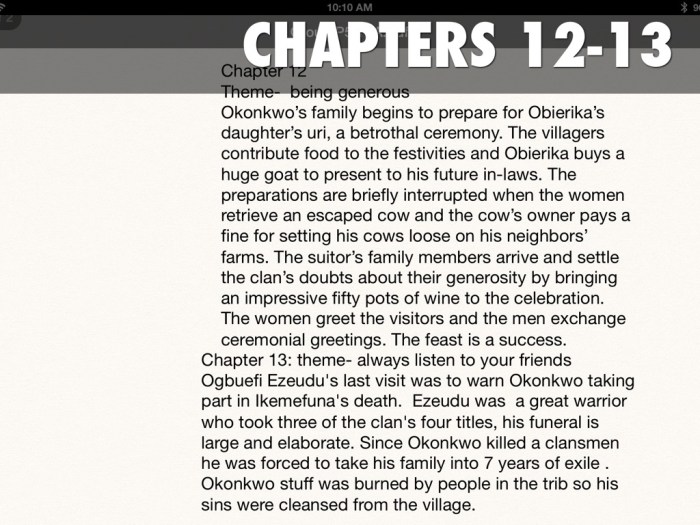
Okonkwo’s return to Umuofia marks a significant turning point in the novel. Having been exiled for seven years, he faces a drastically altered social and political landscape.
Social Challenges
Okonkwo’s exile has eroded his social standing. His former friends and supporters have distanced themselves, and his family has been marginalized. He finds himself an outsider in his own community, struggling to regain his former status.
Political Challenges
The political landscape has also shifted during Okonkwo’s absence. The influence of the white missionaries has grown, and the traditional authority of the Igbo elders is waning. Okonkwo, who has always been a staunch traditionalist, faces opposition from those who embrace the new ways.
Clash of Cultures
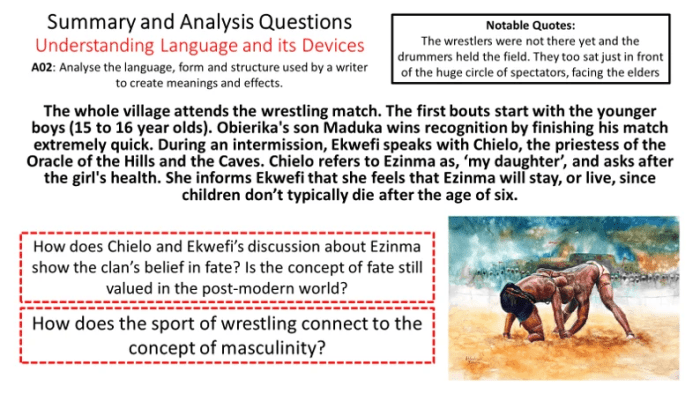
Umuofia and the Christian missionaries represent two vastly different cultures, leading to significant tensions and conflicts. Their contrasting beliefs, values, and practices create a chasm that hinders understanding and fosters animosity.
One of the primary sources of conflict lies in the missionaries’ religious teachings, which directly challenge Umuofia’s traditional beliefs and practices. The missionaries condemn the Igbo religion as pagan and idolatrous, demanding that the people abandon their ancestral customs and embrace Christianity.
This affront to the very core of Umuofia’s identity incites anger and resentment among the villagers.
Missionary Beliefs vs. Igbo Traditions
- Monotheism vs. Polytheism:Missionaries preach the existence of a single God, while Umuofia worships a pantheon of deities.
- Abstinence from Taboos:Missionaries prohibit the consumption of certain foods and the practice of certain customs considered taboo in Umuofia.
- Condemnation of Rituals:Missionaries condemn traditional rituals such as the Feast of the New Yam as heathen practices.
- Rejection of Ancestral Worship:Missionaries reject the Igbo belief in the importance of honoring and appeasing ancestors.
These differences in beliefs and practices create a deep divide between the missionaries and the villagers, fostering a climate of suspicion and mistrust.
Nwoye’s Conversion
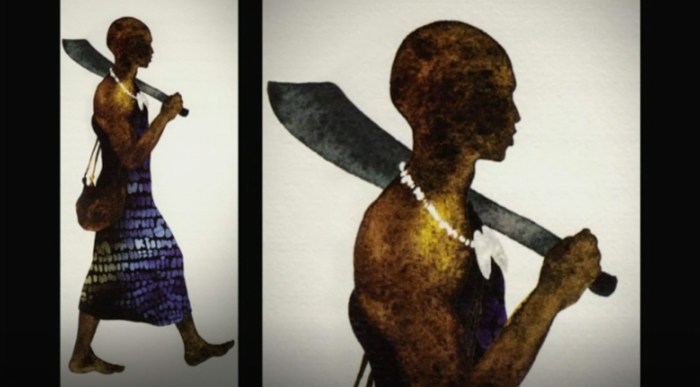
Nwoye’s conversion to Christianity marks a significant turning point in Things Fall Apart, highlighting the clash of cultures and the changing values within Umuofia. This essay analyzes the reasons behind his conversion, its impact on his relationship with his father, and its symbolic significance.
Reasons for Nwoye’s Conversion
Nwoye’s conversion stems from a complex interplay of factors. His dissatisfaction with the harsh and violent nature of Igbo society, coupled with his exposure to the Christian missionaries’ message of love and compassion, leads him to question his traditional beliefs.
Impact on Nwoye’s Relationship with Okonkwo
Nwoye’s conversion creates a deep rift between him and his father, Okonkwo. Okonkwo, a staunch traditionalist, views Christianity as a threat to his authority and the Igbo way of life. He attempts to force Nwoye to renounce his new faith, leading to a bitter conflict between them.
Symbolism of Nwoye’s Conversion, Chapter 12 summary things fall apart
Nwoye’s conversion symbolizes the changing values and beliefs within Umuofia. It represents the erosion of traditional Igbo culture and the growing influence of Western ideas and values. This conversion foreshadows the eventual decline of the Igbo way of life and the rise of a new era.
Umuofia’s Division
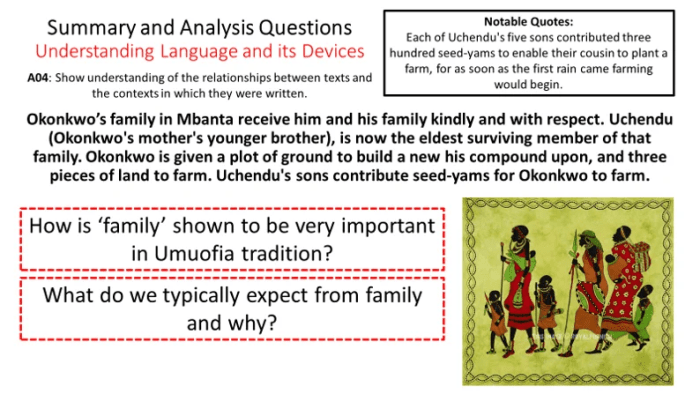
The presence of the missionaries in Umuofia exacerbates existing tensions and creates a deep division within the community. The Igbo tradition and the Christian faith espoused by the missionaries clash, leading to the emergence of distinct factions with conflicting beliefs and motivations.
Emerging Factions
- Traditionalists:Led by Okonkwo, this faction clings fiercely to the Igbo customs and traditions. They view the missionaries as a threat to their way of life and fear the erosion of their cultural identity.
- Converts:This group, primarily composed of younger individuals, embraces the Christian faith and its teachings. They are drawn to the message of peace, forgiveness, and the promise of salvation, challenging the established social order.
- Moderates:A smaller faction, the moderates seek to reconcile the two opposing viewpoints. They acknowledge the value of both tradition and Christianity and strive to find a middle ground that preserves the community’s harmony.
Conflict and Disruption
The division within Umuofia manifests in various forms of conflict and disruption. The traditionalists engage in acts of violence and intimidation against the converts, while the converts challenge the authority of the elders and disrupt traditional ceremonies. The community becomes polarized, with suspicion and mistrust permeating all levels of society.
The division also leads to a breakdown in social cohesion. The traditional bonds of kinship and communal responsibility are weakened as individuals align themselves with different factions. The once-unified community now faces the threat of fragmentation and disintegration.
Helpful Answers: Chapter 12 Summary Things Fall Apart
What is the central conflict in Chapter 12 of Things Fall Apart?
The central conflict in Chapter 12 is the clash between the traditional Igbo culture and the newly introduced Christian religion, which represents the forces of modernity and Westernization.
Why does Nwoye convert to Christianity?
Nwoye converts to Christianity due to his disillusionment with the Igbo religious and social practices, as well as his attraction to the missionaries’ message of love, compassion, and the promise of a better afterlife.
How does Okonkwo respond to the missionaries’ presence?
Okonkwo vehemently opposes the missionaries and their teachings, seeing them as a threat to the Igbo way of life. He uses his authority as a village elder to try to suppress their influence and prevent them from gaining converts.
